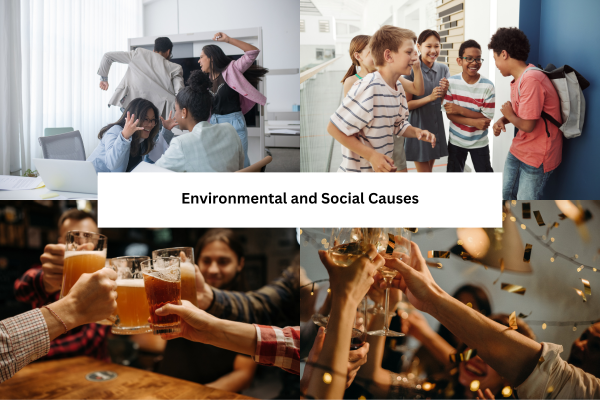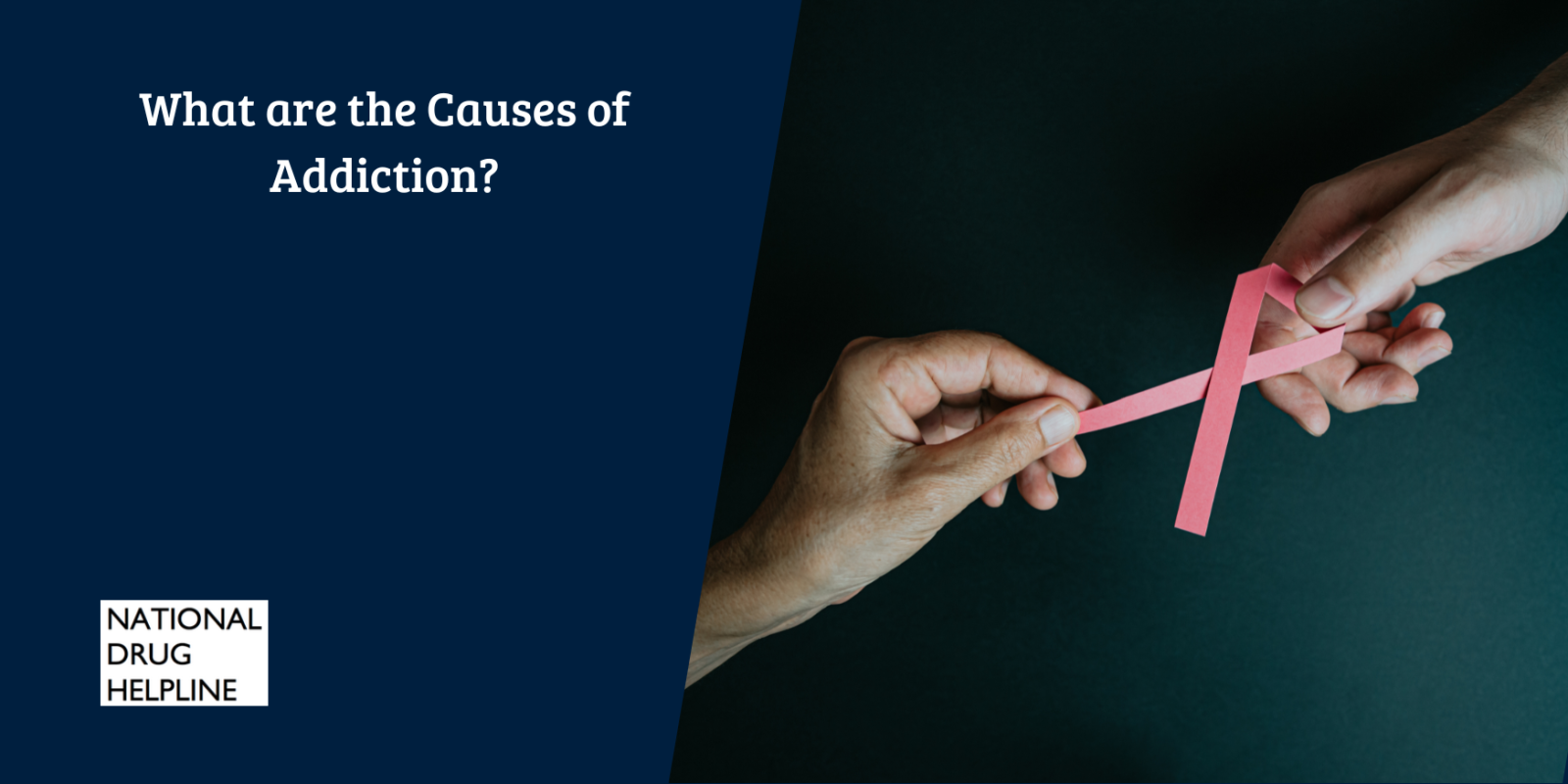Addiction is a serious yet often overlooked condition that affects millions of people globally. It may involve substances such as alcohol, nicotine, or drugs. However, it is also possible to become addicted to behaviors such as gambling, gaming, or even excessive use of the internet. Addiction is not something that happens to everyone who tries a substance or activity. There is no single cause or event that leads to this condition. Instead, there are many factors that may be involved, such as genetics, environment, life circumstances, and coexisting mental health disorders.
By understanding the causes of addictions, it can be easier to recognize the risk factors, reduce stigma surrounding addiction, and support people on the path to recovery.
Genetic and Biological Causes
Family history is a strong predictor of addiction. Research has shown that genetics alone accounts for up to 50% of a person’s vulnerability to addiction. [1] For instance, if there is a history where a parent has struggled with alcoholism, it increases the risk that their child may also develop a similar problem in the future.
But genetics does not work alone, and biology plays a major role. There are many substances and addictive behaviors that may trigger the release of a chemical that is linked to pleasure and reward called dopamine. Initially, when this chemical is released, it may lead to a good feeling.
But with time, as the brain adapts, the production of dopamine may significantly decrease. From then on, the person may need to take more of the substance or do more of the activity to feel the same amount of pleasure. This is known as tolerance, which is a key factor that makes addiction so hard to break. [2]
Mental Health and Psychological Causes
Mental health issues such as depression, anxiety, PTSD, and ADHD often co-exist in people with addiction. In fact, they are closely interrelated, and both conditions can lead to the other. People with addiction may develop mental health conditions secondary to the withdrawal symptoms and increasing tolerance to the substance. Likewise, people with mental health conditions may turn to substances as a way of coping, also called self-medicating. [3]
For example, a person with anxiety may take increasing amounts of alcohol to calm their nerves. Although this may be a temporary solution, it can lead to dependence and make the anxiety worse with time.
There are several other psychological factors that also play a role:
- Personality traits: Impulsive people, such as those who like to take risks or who have a habit of seeking thrills, tend to experiment more with substances.
- Trauma: People with a history of traumatic childhoods, such as abuse, neglect, or major loss during their early developing period, are more vulnerable to both mental health disorders and addiction in their adult life.
- Coping skills: When people lack healthy coping strategies to deal with stress, they are more likely to rely on substances.
In most cases, addiction is not really about the substance or the behavior itself. It is actually more about what the person may be trying to escape from or deal with emotionally.
Environmental and Social Causes

Several factors may influence or lead to addiction, such as where you live, who you spend time with, and the culture around you. Some of the environmental and social factors that lead to addiction include:
- Family environment: If you grew up in a home with neglect, abuse, or substance use, then you may be at a higher risk of developing addiction.
- Peer pressure: Your peers can make or break you. An important influencing factor for addiction, especially in teenagers, is social groups. People in social groups that use drugs or alcohol are more likely to develop an addiction.
- Accessibility: If your surroundings give you easy access to alcohol, drugs, or gambling opportunities, then this also increases the risk substantially.
- Cultural attitudes: In some cultures, it is normal or even encouraged to drink or use certain substances during social gatherings. This makes it harder to notice when use has become harmful.
Brain Chemistry of Addiction
Addiction is not just a matter of willpower, it is an actual disease involving the brain. Substances and addictive behaviors can overtake the reward system of the brain. Over time, this can cause natural rewards such as eating a good meal or spending time with loved ones feel less satisfying in comparison to the addictive behavior.
Using such substances can even change the structure of the brain itself. Some areas of the brain that are responsible for judgment, self-control, and making decisions gradually become weaker. This explains why some people with addictions often continue their behavior in spite of knowing that the particular activity is causing them harm. [4] This happens mainly because their brains eventually become wired to prioritize the addiction above everything else.
Developmental Factors and Age
The age that a person first begins to use a drug or alcohol also matters a lot. Teenagers and young adults are at a higher risk of developing an addiction than older adults. This is mainly because their brains are still in a stage of development. The prefrontal cortex that controls judgment and impulse is also not well developed in young people.
For example, if a person starts drinking during their teenage years, they are more likely to develop alcoholism later in life than someone who starts in their late twenties.
There are some protective factors that can help reduce these risks such as strong family bonds, positive role models, and involvement in sports or community activities.
The Takeaway: What Causes Addiction?
There is no single factor that causes addiction. Instead, there are several mix of factors, including genetics, brain chemistry, mental health, environment, and life experiences. For some, it may begin with curiosity or peer pressure. Whereas for others, it may be a way to escape from pain or trauma.
Although the path to addiction for each person is unique, the road to recovery requires equally personal motivation and a proper support system. By recognizing the causes of addiction, it helps us move away from the blame and toward solutions.
References
| ↑1 | Johnson, E., & Deak, J. (2021). Genetics of substance use disorders: a review. Psychological Medicine, 51(13), 2189–2200. |
|---|---|
| ↑2 | NIDA. 2018, June 6. Understanding Drug Use and Addiction DrugFacts. |
| ↑3 | Turner S, Mota N, Bolton J, Sareen J. Self-medication with alcohol or drugs for mood and anxiety disorders: A narrative review of the epidemiological literature. Depress Anxiety. 2018 Sep;35(9):851-860. |
| ↑4 | Bechara A, Berridge KC, Bickel WK, Morón JA, Williams SB, Stein JS. A Neurobehavioral Approach to Addiction: Implications for the Opioid Epidemic and the Psychology of Addiction. Psychol Sci Public Interest. 2019 Oct;20(2):96-127. |

